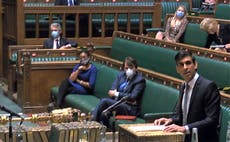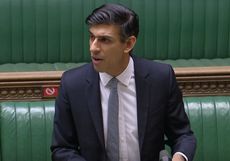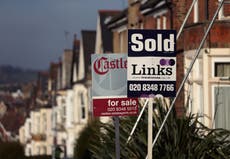Eight English ‘freeports’ to be created with controversial tax breaks
Allowing goods to be imported temporarily without taxes – then shipped on again – has triggered accusations of corruption
Your support helps us to tell the story
From reproductive rights to climate change to Big Tech, The Independent is on the ground when the story is developing. Whether it's investigating the financials of Elon Musk's pro-Trump PAC or producing our latest documentary, 'The A Word', which shines a light on the American women fighting for reproductive rights, we know how important it is to parse out the facts from the messaging.
At such a critical moment in US history, we need reporters on the ground. Your donation allows us to keep sending journalists to speak to both sides of the story.
The Independent is trusted by Americans across the entire political spectrum. And unlike many other quality news outlets, we choose not to lock Americans out of our reporting and analysis with paywalls. We believe quality journalism should be available to everyone, paid for by those who can afford it.
Your support makes all the difference.Eight English ports will be granted controversial tax breaks to “unlock billions of pounds of private sector investment”, the chancellor announced.
The “freeports” will be created at East Midlands airport, the Suffolk ports of Felixstowe and Harwich, the Humber region in Yorkshire, the Liverpool City Region, Plymouth in Devon, the Solent in Hampshire, the Thames near London, and Teesside in the northeast have all been chosen.
The scheme is hugely controversial because it allows goods to be imported temporarily without tariffs, excise duties and other taxes being paid – before the goods are shipped on again.
The EU is cracking down on that whiff of corruption, amid further criticism that business is simply shifted into the freeport, without the overall economy benefitting.
But Mr Sunak said they were a route to “unlocking billions of pounds of private sector investment, generating trade and jobs up and down the country”.
He also claimed they were a boost from Brexit, because the UK was constrained as an EU member, even though seven freeports existed in the UK between the mid-1980s and 2012.
Freeports would “encourage free trade and reinforce our position as an outward looking trading nation, open to the world”, he told MPs.
“A policy we can now only pursue now that we are out of the European Union,” the chancellor claimed.
“Freeports are special economic zones with different rules to make it easier and cheaper to do business. They’re well established internationally, but we’re taking a unique approach.
“Our freeports will have simpler planning to allow businesses to build, infrastructure funding to improve transport links, cheaper customs with favourable tariffs, VAT or duties, and lower taxes, with tax breaks to encourage construction, private investment and job creation.”
Mr Sunak promised “an unprecedented economic boost across the United Kingdom”, working with the Scottish Welsh and Northern Irish administrations to create more.
However, a think tank’s report this week warned the main impact would be to relocate activity and jobs rather than create them.
The main beneficiaries would be businesses and the super-rich who took advantage of the tax breaks, while the public was left to pick up the bill for the infrastructure required.
Up to 40 ports and airports were believed to have applied for the status, which were promised in the Conservative election manifesto.
Mr Sunak also:
- confirmed the extension of the furlough scheme until the end of September, although employers will be expected to make a contribution from July;
- extended the 5 per cent reduced rate of VAT for the tourism and hospitality sector to the end of September, with an interim rate of 12.5 per cent for another six months after that; and
- continued the business rates holiday for the retail, hospitality and leisure sectors until the end of June, with a two-thirds discount for the remaining nine months of the year.
The chancellor also unveiled forecasts suggesting the economy will return to its pre-Covid level by the middle of next year, six months earlier than they previously thought.
But he told MPs that, despite the £280bn of support already committed to protecting the economy, the damage done by the virus has been “acute”.
“Our economy has shrunk by 10 per cent – the largest fall in over 300 years. Our borrowing is the highest it has been outside of wartime.”






Join our commenting forum
Join thought-provoking conversations, follow other Independent readers and see their replies
Comments